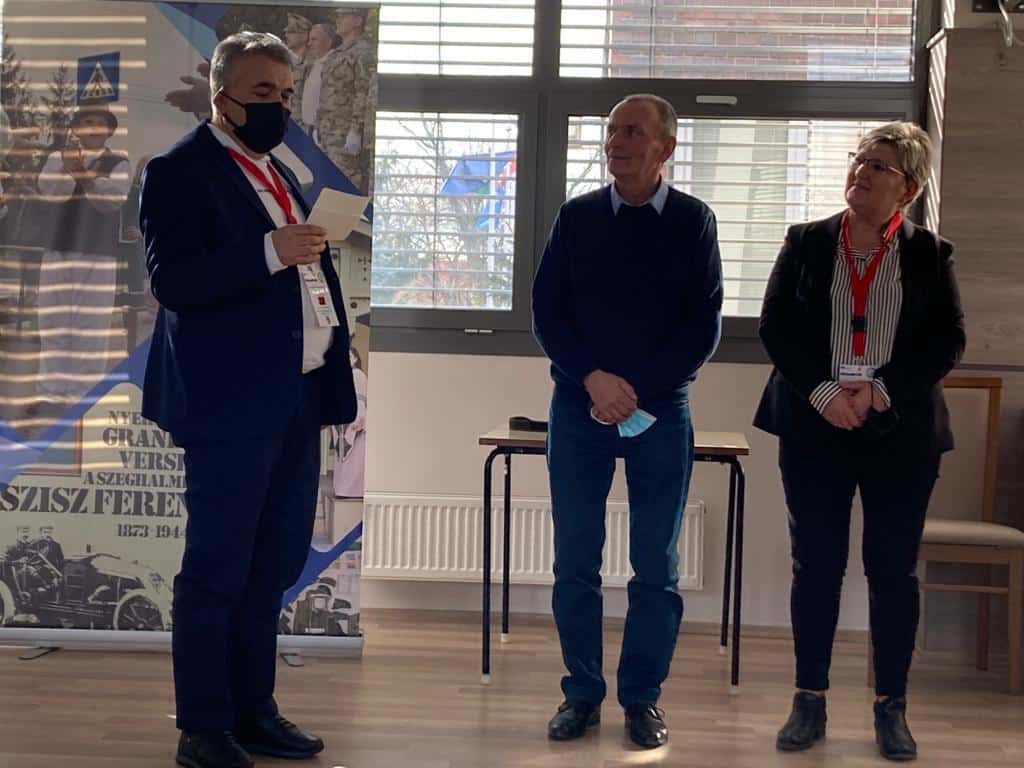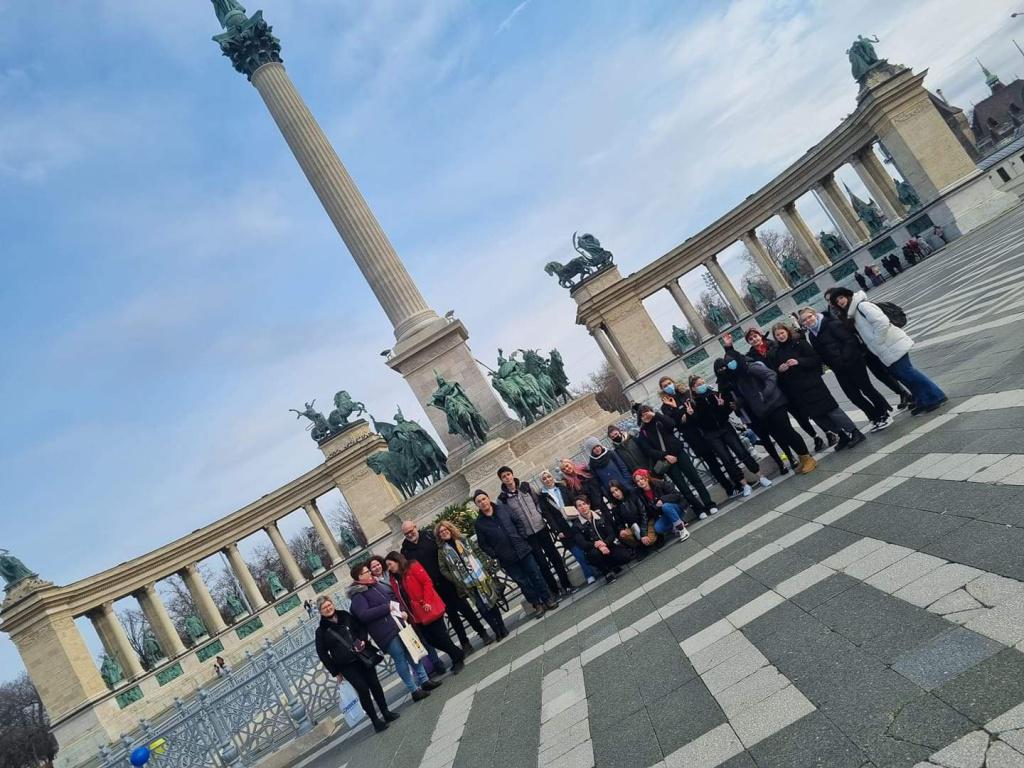
ERASMUS PLUS MACARİSTAN HAREKETLİLİĞİ
Okulumuzun koordinatörlüğünü yaptığı, çevre temalı 'Let's help our precious planet' Erasmus plus projesi çalışmaları kapsamında okulumuz öğretmen ve öğrencileri, 26 Şubat 2022 ve 5 Mart 2022 tarihleri arasında, Macaristan'ın BUDAPEŞTE ve SZEGHALOM şehirlerinde proje faaliyetlerine katılmışlardır.
Geziye proje koordinatörü ve okulumuz İngilizce öğretmeni Şadi ŞİMŞEK başkanlığında Felsefe Öğretmenimiz Selma Acar ile birlikte 7 öğrencimiz katılmışlardır.
Gezi boyunca çeşitli proje faaliyetleri dışında, ülkenin tarihi ve turistik yerleri ziyaret edilmiş, ülkenin eğitimi ve kültürü hakkında bilgiler edinilmiş ve dostluklar kurulmuştur.
Son derece güzel, eğlendirici ve öğretici geçen çalışmaların sonunda tüm katılımcılara sertifikaları verilmiştir.
HUNGARIAN MOBILITY
Budapest, February 27, 2022. First official day of this new meeting of our Erasmus+ project "Let's Help Our Precious Planet". This time, the desire to involve students and teachers from Hungary, Turkey, Poland and Portugal in the continuation of the study and development of an environmental education and awareness, brought us to Budapest where we met again. The day was dedicated to getting to know the city (which is absolutely wonderful) and, in particular, the Széchenyi thermal bath, a fantastic natural hot spring that will be sorely missed over the next week. The city of Budapest is amazing! Founded in 1873, it was created from the junction of two cities, Buda and Pest, located on the banks of the city's symbol, the Danube River. After a memorable and tiring day, it was time to start moving (by bus) to our final destination - Szeghalom, a small town in western Hungary, our host for the next week!
Today, after breakfast, the day started with group dynamics activities. Small workshops were held at our hotel until lunchtime, with the objective of getting to know each other and create an increasingly environmental awareness and concern for our planet. The morning's work was only interrupted by the surprising arrival of snowfall that turned the Portuguese students into very happy beings as it was the first time they saw the white flakes falling. The other students from Turkey, Hungary and Poland watched, with amusement, the joy of the "tugas".
After lunch, it was time to get to know the school and the city that welcome us so well. In the gymnasium of the Péter András school, other group activities took place until we went for a walk around the city. Szeghalom is a small town, in the county of Békés, in western Hungary, with about 9000 inhabitants and bathed by the river Berettyó. Our guides, extraordinary and very patient students, ended the day with a visit to the school. I love the idea that, at the end of each school year, a board is made with the photographs of all the graduating students. Through these photos we can see the evolution of clothing, haircuts and even the type of graphic design that was practiced each year. They are unforgettable historical records.
After the end of the visit, some more group activities that included the experimentation of various traditional games and culminated with almost all the participants dancing to traditional songs from the countries involved in the project.
The end of the day came with dinner at the hotel and a "pajama party" for the younger ones.
The beginning of the third day of the Erasmus+ project "Let's Help Our Precious Planet" started with the creation of posters where our students created posters that remind us that we need to "REUSE, REDUCE AND RECYCLE". Keywords that have to get off the paper and become a reality, at least for the participants of this project. Then they created scripts for small films that they started filming on the subject. And, before lunch, each one of the students created their own Ecological Footprint and analyzed the results. Some of them were really surprised...
While the young people worked on one side, the teachers worked on the other and gathered to evaluate and plan the continuity of the project and the next meetings. After lunch, the destination was the town hall of Szeghalom where we were friendly received by its mayor. He welcomed us, introduced his municipality and wanted to praise his citizens for the enormous help they gathered with a lot of items that are going to be delivered, tomorrow, to the citizens of Ukraine who are being victims of an unexpected and completely stupid war. Huge round of applause in the room! After this, we went to visit the dormitory that welcomes, during the week, students who live far from our host school. An old manor house transformed into a cozy space that unequivocally serves its objectives. Afterwards, the group was divided into two, with the younger ones heading to school where they spent the afternoon in recreational and sports activities while the older ones (the teachers) went to visit a nearby town - Gyula - where they had contact with natural methods, controlled and environmental standards for the production of one of Hungary's most famous beverages, Pálinka. Received by Attila Fabulya, an enthusiast of organic and sustainable agriculture who explained the entire process of creating the drink, from the preservation of centuries-old land to the use of fruits planted on the farm itself that contribute to the maintenance of the natural balance. The day was approaching the end and, after dinner, it was time to go back to the rooms and rest because tomorrow will be very busy. We are all loving this land and these cordial and very friendly people!
Tomorrow, third day of the project.
The fourth day of this Erasmus+ project "Let's Help Our Precious Planet" will have been the busiest day of the week. The day started very early with the whole group leaving for Poroszló to visit the Tisza-tavi Ökocentrum, considered in Hungary as "the largest freshwater aquarium system in Europe". In addition to many fishes and Charlie the turtle, there was still opportunity to see eagles and foxes and goats and goats and sheep in captivity. The rabbits were sleeping and the ducks and geese were walking around. After the visit and a 3D movie that showed us the beauties of the "flat lands" of Hungary, we headed to Hortobágy that is a village in Hajdú-Bihar County in eastern Hungary. It lies on the banks of the Hortobágy river, which is crossed at Hortobágy by the Nine-arched Bridge, one of the main man-made monuments of the Hortobágy National Park. The park consists mainly of the remaining areas of Hungarian "puszta". A short walking tour and then what would have been the highlight of the day for many of the participants took place: a visit to a stud farm with fantastic horses that were petted and caressed by most of those present. The person responsible for the space told us about the breeding system and the environmental and animal concern that he has on his lands so that everything is done with the least possible impact. Visit finished, time to head to Debrecen, a city that is located on the Great Hungarian Plain (Alföld in Hungarian). The city, which was already a cultural, artistic and scientific center, in recent years has seen its economy develop, due in part to foreign investments. Our visit to the city had as main objective to visit the University of Debrecen (Debreceni Egyetem). We walked through the different spaces guided by a Biology student who told us about the different existing courses and the history of the university. Tired from the long day, we got back on our bus to return to Vidra Tanya but, during the trip, we sang happy birthday in four languages to our project coordinator, teacher Şadi Şimşek who celebrated his birthday today. And tomorrow, the work week ends. There's already some nostalgia in the air...
Last day.
Needless to say more when the week was extraordinary.
Many and many tears have already flowed and tomorrow there will be more. I am sure! The day ended with an international dance party. All the students (and some teachers!...) danced and had fun for the last time at this meeting in Hungary. But until night came, the day was very busy. In the morning, several workshops were held on food waste and on environmental protection measures common to the whole of Europe (to the whole world, I would say...). It was felt that it was the last day and the work was interspersed many times with hugs and kisses and promises of reunion. There's not much more to say. As our host, teacher Csilla Kóvarí, said, Erasmus projects connect us through understanding, connection, participatory work, acceptance, friendship, European identity and active citizenship.
Szeghalom has come to an end. But our Erasmus+ project "Let's Help Our Precious Planet" will continue in more meetings and, above all, in the individual consciousness that we created together for a better planet. We don't need wars! We don't want wars!






